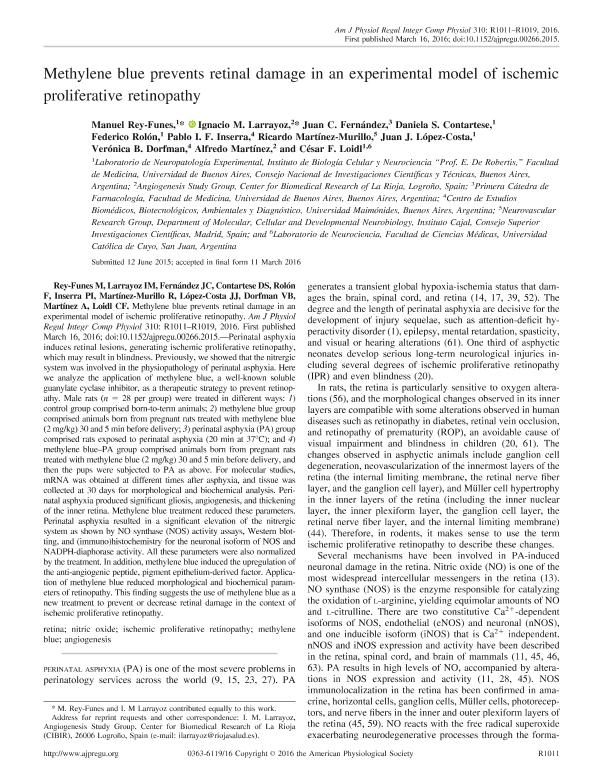Mostrar el registro sencillo del ítem
dc.contributor.author
Rey Funes, Manuel

dc.contributor.author
Larráyoz, Ignacio M.

dc.contributor.author
Fernández, Juan C.
dc.contributor.author
Contartese, Daniela Soledad

dc.contributor.author
Rolón, Federico
dc.contributor.author
Inserra, Pablo Ignacio Felipe

dc.contributor.author
Martínez Murillo, Ricardo

dc.contributor.author
López, Juan José

dc.contributor.author
Dorfman, Verónica Berta

dc.contributor.author
Martínez, Alfredo
dc.contributor.author
Loidl, Cesar Fabian

dc.date.available
2018-06-05T20:47:51Z
dc.date.issued
2016-06
dc.identifier.citation
Rey Funes, Manuel; Larráyoz, Ignacio M.; Fernández, Juan C.; Contartese, Daniela Soledad; Rolón, Federico; et al.; Methylene blue prevents retinal damage in an experimental model of ischemic proliferative retinopathy; American Physiological Society; American Journal Of Physiology-regulatory, Integrative And Comparative Physiology; 310; 11; 6-2016; 1011-1019
dc.identifier.issn
0363-6119
dc.identifier.uri
http://hdl.handle.net/11336/47408
dc.description.abstract
Perinatal asphyxia induces retinal lesions, generating ischemic proliferative retinopathy, which may result in blindness. Previously, we showed that the nitrergic system was involved in the physiopathology of perinatal asphyxia. Here we analyze the application of methylene blue, a well-known soluble guanylate cyclase inhibitor, as a therapeutic strategy to prevent retinopathy. Male rats (n = 28 per group) were treated in different ways: 1) control group comprised born-to-term animals; 2) methylene blue group comprised animals born from pregnant rats treated with methylene blue (2 mg/kg) 30 and 5 min before delivery; 3) perinatal asphyxia (PA) group comprised rats exposed to perinatal asphyxia (20 min at 37°C); and 4) methylene blue-PA group comprised animals born from pregnant rats treated with methylene blue (2 mg/kg) 30 and 5 min before delivery, and then the pups were subjected to PA as above. For molecular studies, mRNA was obtained at different times after asphyxia, and tissue was collected at 30 days for morphological and biochemical analysis. Perinatal asphyxia produced significant gliosis, angiogenesis, and thickening of the inner retina. Methylene blue treatment reduced these parameters. Perinatal asphyxia resulted in a significant elevation of the nitrergic system as shown by NO synthase (NOS) activity assays, Western blotting, and (immuno)histochemistry for the neuronal isoform of NOS and NADPH-diaphorase activity. All these parameters were also normalized by the treatment. In addition, methylene blue induced the upregulation of the anti-angiogenic peptide, pigment epithelium-derived factor. Application of methylene blue reduced morphological and biochemical parameters of retinopathy. This finding suggests the use of methylene blue as a new treatment to prevent or decrease retinal damage in the context of ischemic proliferative retinopathy.
dc.format
application/pdf
dc.language.iso
eng
dc.publisher
American Physiological Society

dc.rights
info:eu-repo/semantics/openAccess
dc.rights.uri
https://creativecommons.org/licenses/by-nc-sa/2.5/ar/
dc.subject
Angiogenesis
dc.subject
Ischemic Proliferative Retinopathy
dc.subject
Methylene Blue
dc.subject
Nitric Oxide
dc.subject
Retina
dc.subject.classification
Neurociencias

dc.subject.classification
Medicina Básica

dc.subject.classification
CIENCIAS MÉDICAS Y DE LA SALUD

dc.title
Methylene blue prevents retinal damage in an experimental model of ischemic proliferative retinopathy
dc.type
info:eu-repo/semantics/article
dc.type
info:ar-repo/semantics/artículo
dc.type
info:eu-repo/semantics/publishedVersion
dc.date.updated
2018-05-28T14:50:35Z
dc.journal.volume
310
dc.journal.number
11
dc.journal.pagination
1011-1019
dc.journal.pais
Estados Unidos

dc.journal.ciudad
Bethesda
dc.description.fil
Fil: Rey Funes, Manuel. Consejo Nacional de Investigaciones Científicas y Técnicas. Oficina de Coordinación Administrativa Houssay. Instituto de Biología Celular y Neurociencia ; Argentina
dc.description.fil
Fil: Larráyoz, Ignacio M.. Angiogenesis Study Group. Center for Biomedical Research of La Rioja; España
dc.description.fil
Fil: Fernández, Juan C.. Universidad de Buenos Aires. Facultad de Medicina. Cátedra de Farmacología; Argentina
dc.description.fil
Fil: Contartese, Daniela Soledad. Consejo Nacional de Investigaciones Científicas y Técnicas. Oficina de Coordinación Administrativa Houssay. Instituto de Biología Celular y Neurociencia ; Argentina
dc.description.fil
Fil: Rolón, Federico. Consejo Nacional de Investigaciones Científicas y Técnicas. Oficina de Coordinación Administrativa Houssay. Instituto de Biología Celular y Neurociencia ; Argentina
dc.description.fil
Fil: Inserra, Pablo Ignacio Felipe. Consejo Nacional de Investigaciones Científicas y Técnicas; Argentina. Universidad Maimónides. Área de Investigaciones Biomédicas y Biotecnológicas. Centro de Estudios Biomédicos, Biotecnológicos, Ambientales y de Diagnóstico. Departamento de Estudios Biomédicos y Biotecnológicos; Argentina
dc.description.fil
Fil: Martínez Murillo, Ricardo. Consejo Superior de Investigaciones Científicas; España
dc.description.fil
Fil: López, Juan José. Consejo Nacional de Investigaciones Científicas y Técnicas. Oficina de Coordinación Administrativa Houssay. Instituto de Biología Celular y Neurociencia ; Argentina
dc.description.fil
Fil: Dorfman, Verónica Berta. Consejo Nacional de Investigaciones Científicas y Técnicas; Argentina. Universidad Maimónides. Área de Investigaciones Biomédicas y Biotecnológicas. Centro de Estudios Biomédicos, Biotecnológicos, Ambientales y de Diagnóstico. Departamento de Estudios Biomédicos y Biotecnológicos; Argentina
dc.description.fil
Fil: Martínez, Alfredo. Angiogenesis Study Group. Center for Biomedical Research of La Rioja; España
dc.description.fil
Fil: Loidl, Cesar Fabian. Consejo Nacional de Investigaciones Científicas y Técnicas. Oficina de Coordinación Administrativa Houssay. Instituto de Biología Celular y Neurociencia ; Argentina. Universidad Católica de Cuyo - Sede San Juan. Facultad de Ciencias Médicas. Departamento de Neurociencia; Argentina
dc.journal.title
American Journal Of Physiology-regulatory, Integrative And Comparative Physiology

dc.relation.alternativeid
info:eu-repo/semantics/altIdentifier/doi/https://dx.doi.org/10.1152/ajpregu.00266.2015
dc.relation.alternativeid
info:eu-repo/semantics/altIdentifier/url/https://www.physiology.org/doi/10.1152/ajpregu.00266.2015
Archivos asociados
